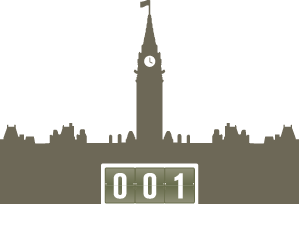
Day One–
And Beyond
June 2, 2011. The 41st Parliament sits for the first time. The first order of business is the election of the Speaker; after six rounds of secret ballots, the Honourable Andrew Scheer is elected by his peers to be Speaker of the House. For Members and the House Administration alike, all the work leading up to this point is just the beginning. An entire year of new parliamentary business awaits.
Supporting Members year round
Once the new session of Parliament was officially underway, Members had the opportunity to learn more about the services available to them. On June 13, representatives from the House Administration and the Library of Parliament held a service fair in the Centre Block, hosted by representatives from areas such as printing, communications, security, interpretation and translation. This event not only connected Members to a broader array of vital services
but also helped them build networks of contacts within the organizations.
To further assist Members in their daily activities, the House Administration and the Library of Parliament coordinated a series of seminars and professional development workshops on topics such as the parliamentary cycle, the legislative process and handling constituency casework.
Using resources efficiently
Before, during and after an election, the House Administration is tasked with delivering high-quality services that make the most efficient use of limited resources. For example, by revising and repackaging the welcome kits sent to new Members, the House Administration was able to cut costs while making the material more useful to Members.
This focus on efficiency and cost savings was maintained and built upon throughout the year; for example, by developing standards for the use of meeting rooms and aligning the House’s security program with the goals of the Master Security Plan (a partnership between the Senate, the House of Commons and the Royal Canadian Mounted Police).
It was then formalized in September 2011 when the Board of Internal Economy asked the House Administration to review its operations and identify further efficiencies. The Board approved the proposed savings and reduction strategy in March 2012, which will see spending for the House of Commons decrease by $30.3 million by 2014–2015 through budget reductions, operational efficiencies, service delivery transformation, retirements and the elimination of vacant positions.
Staff from the six service areas support the House Administration’s Orientation and Election Readiness Program. The effective coordination of resources across the organization is a critical factor in the success of this program given the complexity involved in transitioning a large number of departing and newly elected Members on the Hill and in constituencies across Canada.
Perspective: Caucuses
Most Members of Parliament belong to a political party; together with their colleagues in the Senate (if the party is represented in the Upper House), they make up that party’s parliamentary caucus. Each caucus meets weekly to discuss policies, plan strategy and develop positions on issues being debated in the House of Commons. Held in private, caucus meetings allow Members to express their views and opinions freely.
Each party assigns a Member to be its Whip, who is responsible for ensuring discipline within the caucus. The House Administration works closely with the Whips to allocate office space to Members and to schedule speakers for various bills, motions and other House proceedings.
Perspective: International

Whether welcoming visitors to the House of Commons or participating in delegations to foreign legislatures and international conferences, Members of Parliament play an active role in representing our country to the rest of the world.
In 2011–2012, the Parliament of Canada received a number of distinguished guests, including the Right Honourable David Cameron, Prime Minister of the United Kingdom, who delivered an official address to Members and Senators the first by a British prime minister since 2001. Members were also invited to discuss issues with colleagues in other parliaments; for example, the Speaker attended the 10th Meeting of the Speakers of the Lower Houses of the G8 in Paris.
As part of their respective roles, the Speakers of the Senate and the House also liaise with foreign dignitaries and the diplomatic community; for example, by receiving calls from arriving and departing ambassadors to Canada. Last year, the Speaker of the House received 67 courtesy calls.